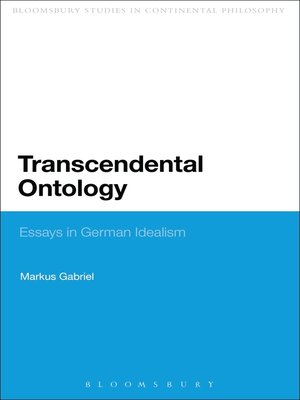Transcendental Ontology
ebook ∣ Essays in German Idealism · Continuum Studies in Philosophy
By Markus Gabriel

Sign up to save your library
With an OverDrive account, you can save your favorite libraries for at-a-glance information about availability. Find out more about OverDrive accounts.
Find this title in Libby, the library reading app by OverDrive.



Search for a digital library with this title
Title found at these libraries:
| Library Name | Distance |
|---|---|
| Loading... |
Transcendental Ontology in German Idealism: Schelling and Hegel sheds remarkable light on a question central to post-Kantian philosophy: after the Copernican Revolution in philosophy, what can philosophy say about the world or reality as such? What remains of ontology's task after Kant? This is a question often overlooked in contemporary scholarship on German Idealism.
Markus Gabriel offers a refreshing reinvigoration of a range of questions concerning scepticism, corporeality, freedom, the question of being, the absolute and the modal status of our determinations and judgments, all crucial to our understanding of the truly radical nature of post-Kantian philosophy. Gabriel's assessment of the experiments undertaken in post-Kantian ontology reaffirms Schelling's and Hegel's place at the heart of contemporary metaphysics. The book shows how far we still have to go in mining the thought of Hegel and Schelling and how exciting, as a result, we can expect twenty-first century philosophy to be.
Markus Gabriel offers a refreshing reinvigoration of a range of questions concerning scepticism, corporeality, freedom, the question of being, the absolute and the modal status of our determinations and judgments, all crucial to our understanding of the truly radical nature of post-Kantian philosophy. Gabriel's assessment of the experiments undertaken in post-Kantian ontology reaffirms Schelling's and Hegel's place at the heart of contemporary metaphysics. The book shows how far we still have to go in mining the thought of Hegel and Schelling and how exciting, as a result, we can expect twenty-first century philosophy to be.







